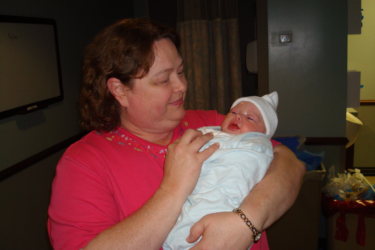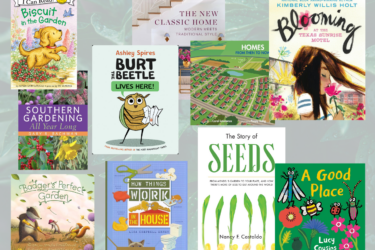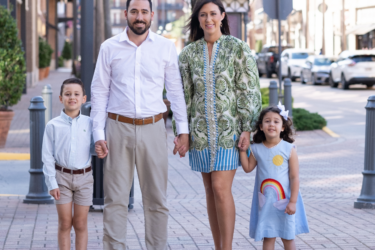
You Want To Do What?!
Local mom Nicole Morello knew her son Bruce was sensitive to animals, but when he told her he would no longer eat beef, she was a little surprised. He is only eight years old, after all. Should he be making these kinds of decisions?
Carlen Ensley, Baton Rouge single mom, noticed her daughter Cate talking about all things Batman when she was a preschooler. Though an unorthodox hero choice for a small girl, Carlen let it take its course. The fascination grew into a near obsession: dressing as Batman for three Halloweens, Batman toys and accessories, and Batman cartoons every weekend. Was this normal? How much Batman stuff could a little girl need?
Bethany Riggs was shocked when her two-year-old daughter, Indigo, repeatedly asked for short hair. She was an active child, after all, and was annoyed with hair getting in her eyes. After much debate, she obliged her request and cut it short. Now, at five years old, her hair has been a buzzcut, a faux hawk, pink, and a pixie cut, and she is still happy, no matter what others may say.
Children are individuals with their own minds and opinions. Sometimes they surprise us with their depth and understanding, and sometimes they surprise us with their unique decisions. As the parent, how much do you allow them to form their own decisions? When do you encourage independent thinking and when do you step in to protect the child?
For these three local mothers, reality hit hard when their young children made conscious and specific decisions that were out of the norm. Robin Marrero, LCSW and mother of two sons, believes parents should first validate their child’s value, then communicate to understand, and finally convey the possible consequences to measure the child’s ability to cope with criticism.
Express Value of the Child
Whether it’s not eating meat, choosing an atypical hero, or wearing unique hairstyles, children need to understand they are loved no matter what. Robin advises, “First and foremost, parents should affirm the child’s value and preciousness, and show them that they like and love who they are.” Priority should always be to assure love and acceptance.
Carlen confirms, “Enjoy your children and embrace them for who they are. Your support of them is far more important than what other people think.”
Communicate To Understand
One of the greatest ways to show a child he or she has value is by listening to them. Robin agrees, “Try to understand how they arrived at that decision. What was their thinking and the information they based the decision on? Encourage a discussion and exchange of information about how they made the choice and what the consequences are. Be involved and help them gather more information or find experts to talk with.”
Nicole and her husband had that conversation with their son Bruce after he walked in on a shocking scene from a documentary on the meat industry. “We have always believed that it is important for our children to understand that food doesn’t just magically appear on grocery store shelves, so we spoke to him honestly about where beef comes from. At the end of the conversation, he told us that he really likes cows and no longer wished to eat them. We both told him that we respected his decision and would honor it since it was based on a moral objection and not out of pickiness. We are proud of him for sticking to his principles and will continue to support him as long as he wishes to forgo beef,” Nicole acknowledges. She continues to talk to him when he has questions and cooks dinners that he can eat.
Are They Ready For the Consequences?
Everyone may not support their uniqueness. Are they able to handle the pushback? Robin recommends asking the following questions, “How will they feel if peers or others don’t approve? How will the decision affect their lives and how will they manage on a daily basis? Will it affect others around them?” Children learn at an early age how others’ comments can impact them, so it is important that they are fully aware of possible reactions.
“I would make sure they understand and are prepared for the consequences. Some children have a better sense of self than others and are less affected by others’ opinions. If a parent knows they have a more sensitive child, I would spend more time on how they will handle this and what it may feel like. They may need help weighing the negatives and positives,” Robin encourages.
Bethany shares her experience with Indigo, “When she started asking for short hair, I resisted at first. She was only two. Was she even old enough to make such a decision? She had no concept of the consequences: getting mistaken for a boy, being teased, getting strange looks, etc. I was afraid she would cut it short and hate it, and wouldn’t understand that she’d have to wait for it to grow back. But the more she asked, the more I realized I was saying no out of my own insecurities. It’s her body, her hair, and I want her to grow up feeling empowered to make decisions about her own self. So, I took her to get a haircut. She was so happy with her pixie style that she was practically glowing in the salon chair.”
Above all, these mothers agree that support carries weight at any age. Children will thrive when they have the opportunity to make choices, but it is a parent’s job to guide them. Robin emphasizes, “Help them gather information, make sure they understand the consequences and if you don’t have any health or safety concerns, support them to move forward–with the understanding that they have to take responsibility for the decision and the changes it requires.”
Parenting can be difficult, but watching their little personalities develop make it worthwhile. Bethany reasons, “Any control we can give to our kids will be valuable in teaching them how to be responsible and confident adults. So as much as you can, just roll with it. The dye will fade, the hair will grow back, and the confidence will begin to take root.” ■





